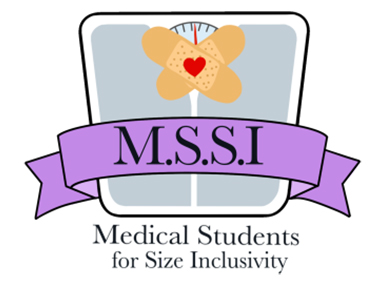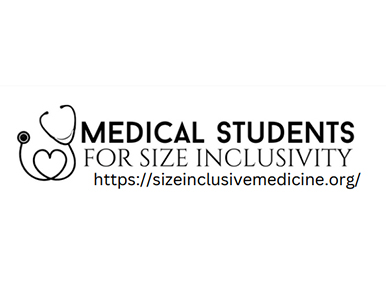Highlight: Medical Students for Size Inclusivity (MSSI)
April 14, 2024

“We are a community of medical students raising awareness about the harms of weight discrimination in the healthcare system. We believe all people, regardless of their weight, body shape, and size, deserve equitable medical treatment and the right to pursue health.”
We want to highlight this amazing group of medical students as an example of how those of us working in health fields and education can take a stand and make a difference in reducing weight stigma and anti-fat bias in our work and in society. Like public health, the medical field has done much to perpetuate weight stigma and cause harm to those in larger bodies. It is great to see these students taking a leadership role in making change.
 In response to concerns about the weight bias they experienced in their medical education, six medical students representing 4 different institutions started “Medical Students for Size Inclusivity” in April 2022. Since then, they have recruited a large Board of Advisors, hosted events, been featured in SELF magazine and published a response to the American Academy of Pediatrics “guidelines for the treatment of children and adolescents with ob*sity.” You can check out more about their story and mission on their website.
In response to concerns about the weight bias they experienced in their medical education, six medical students representing 4 different institutions started “Medical Students for Size Inclusivity” in April 2022. Since then, they have recruited a large Board of Advisors, hosted events, been featured in SELF magazine and published a response to the American Academy of Pediatrics “guidelines for the treatment of children and adolescents with ob*sity.” You can check out more about their story and mission on their website.
One particularly impressive aspect of their organization is that they have a Board of Advisors that reflects a diversity of body sizes, as well as a variety of credentials and expertise. Unlike many others who are perpetuating weight stigma while claiming to be against it, MSSI is genuinely working at the intersection of science and fat activism to reduce weight stigma.
Here are some sample resources from their website:
GLP-1 Agonist Informed Consent Project
Created in response to the explosion in prescriptions for GLP-1 agonist drugs for weight loss, and MSSI’s concern that patients are taking these drugs without full knowledge and consent, this tool is designed to help both patients and providers.
“Our goal is to give patients desiring to start medications to lose weight a more comprehensive understanding of the risks and benefits associated. Knowing what alternatives are available is part of full informed consent, so we also include evidence-based options for improving health that do not require weight loss.”
Lecture Analysis Tool
As part of their curriculum reform efforts, MSSI provides a tool developed by a group of activists and academics that can be used by both students and teachers to analyze class materials from health sciences curricula.
“By advocating for curricular change, we hope that all medical students and providers learn the importance of recognizing personal biases against patients in larger bodies.”
Language Guidelines
In addition to pointing out how common words used to reference body size are stigmatizing, MSSI also takes on the currently popular (yet harmful) “person first language.”
“We recognize that in the medical community, there are numerous terms used to describe bigger bodies that are stigmatizing and harmful. Our organization seeks to bridge the gap between the current medical landscape and the marginalized communities for whom consideration and care have been historically lacking or absent. Here are our commitments to address the harmful terminology utilized in medical environments.”

For those seeking to genuinely reduce the incidents and harm of weight stigma in medical practice and education, MSSI is an invaluable resource. Please support them!
EDUCATOR'S TIP
- Review MSSI’s Language Guidelines and update your presentations where needed.
- Use the Lecture Analysis Tool linked above, or create an activity where students can use it to analyze various aspects of their curriculum.
- Share the tool with colleagues and create opportunities for discussion.
ALLY ACTION
If you know any medical or related health professions students, make sure they know about MSSI! Check out their Shareable Resources – and share them! And, here is a flyer you can post or share.